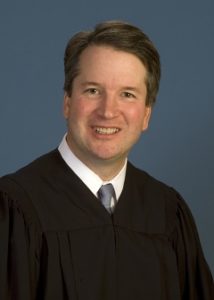Judge Brett Kavanaugh’s Record on the Environment
He’s highly conservative but has acknowledged the seriousness of climate change
 Judge Brett Kavanaugh, Donald Trump’s choice to replace Justice Anthony Kennedy, has been pretty staunchly conservative in his environmental rulings on the D.C. Circuit Court of Appeals in the last 12 years. He voiced serious skepticism about the validity of the Clean Power Plan during oral arguments on the case in 2016. He struck down the Clean Air Interstate Rule – which regulates cross border pollution from power plants — and stayed its effect, only to be overturned by the Supreme Court in a majority that included Justice Roberts and Kennedy in EME Homer Generation v. EPA. In a dissenting opinion filed when the D.C. Circuit refused to rehear a significant Clean Air Act case involving the regulation of greenhouse gases from new factories and industrial sources, he laid out a cribbed interpretation of the Environmental Protection Agency’s authority, a position ultimately adopted by Justice Antonin Scalia in UARG v. EPA. He wrote the majority opinion in a 2017 case striking down EPA’s regulation of hydroflourocarbons, a potent greenhouse gas, as outside EPA’s authority under the Clean Air Act, a position contrary to that argued by the Trump/Sessions Department of Justice (a cert petition is pending in the U.S. Supreme Court). In fact, Judge Kavanaugh’s reasoning in the hydroflourocarbons is a strong predictor of how he will rule in future Clean Air Act cases involving greenhouse gases. Here is the most telling language:
Judge Brett Kavanaugh, Donald Trump’s choice to replace Justice Anthony Kennedy, has been pretty staunchly conservative in his environmental rulings on the D.C. Circuit Court of Appeals in the last 12 years. He voiced serious skepticism about the validity of the Clean Power Plan during oral arguments on the case in 2016. He struck down the Clean Air Interstate Rule – which regulates cross border pollution from power plants — and stayed its effect, only to be overturned by the Supreme Court in a majority that included Justice Roberts and Kennedy in EME Homer Generation v. EPA. In a dissenting opinion filed when the D.C. Circuit refused to rehear a significant Clean Air Act case involving the regulation of greenhouse gases from new factories and industrial sources, he laid out a cribbed interpretation of the Environmental Protection Agency’s authority, a position ultimately adopted by Justice Antonin Scalia in UARG v. EPA. He wrote the majority opinion in a 2017 case striking down EPA’s regulation of hydroflourocarbons, a potent greenhouse gas, as outside EPA’s authority under the Clean Air Act, a position contrary to that argued by the Trump/Sessions Department of Justice (a cert petition is pending in the U.S. Supreme Court). In fact, Judge Kavanaugh’s reasoning in the hydroflourocarbons is a strong predictor of how he will rule in future Clean Air Act cases involving greenhouse gases. Here is the most telling language:
The Supreme Court cases that have dealt with EPA’s efforts to address climate change have taught us two lessons that are worth repeating here. First, EPA’s well- intentioned policy objectives with respect to climate change do not on their own authorize the agency to regulate. The agency must have statutory authority for the regulations it wants to issue. Second, Congress’s failure to enact general climate change legislation does not authorize EPA to act. Under the Constitution, congressional inaction does not license an agency to take matters into its own hands, even to solve a pressing policy issue such as climate change.
The takeaway message, for me, from all of these cases is that he will construe EPA authority very narrowly and virtually always, but not every single time, in favor of regulated parties and against environmental interests. As Dan Farber has previously noted, Judge Kavanaugh has ruled in favor of an environmental plaintiff in a case in which he, again, construed EPA authority narrowly. Somewhat surprisingly in a concurring opinion in the case, he acknowledged the seriousness of climate change. He joined Judge David Tatel (a Clinton appointee) in striking down an EPA rule postponing for three years the regulation of biogenic carbon dioxide from Clean Air Act permitting requirements. The D.C. Circuit held in Center for Biological Diversity v EPA that EPA lacked the authority to defer regulating biogenic carbon dioxide. Kavanaugh wrote a concurring opinion emphasizing that he thinks EPA was wrong in holding that carbon dioxide is a pollutant under the permitting program at issue (known as the PSD program) but that if the agency requires permits for new sources of carbon dioxide, it lacks the statutory authority to then exempt emitters of biogenic carbon dioxide from the permitting program. In so doing, he wrote the following:
I do not want to diminish EPA’s vital public objectives in addressing global warming. The task of dealing with global warming is urgent and important at the national and international level.
Judge Kavanaugh, in other words, may believe that global warming is a real problem but he’s not going to recognize EPA’s power to do much at all to regulate greenhouse gases.
Reader Comments
2 Replies to “Judge Brett Kavanaugh’s Record on the Environment”
Comments are closed.







“Under the Constitution, congressional inaction does not license an agency to take matters into its own hands, even to solve a pressing policy issue such as climate change.”
Is this judicial pretense for pro-business decisions, or sincere judicial philosophy? If the latter, consider Kavanaugh’s view on criminal prosecution of a sitting president in a 2009 Minnesota Law Review article:
“Congress might consider a law exempting a President — while in office — from criminal prosecution and investigation, including from questioning by criminal prosecutors or defense counsel.”
Since Congress has not passed any law exempting a sitting president from criminal prosecution and investigation, we may soon see Kavanaugh’s true judicial colors.
My heart aches for those at the EPA wanting to protect the public yet not being permitted to do the job we all need them to do. Hang in there!